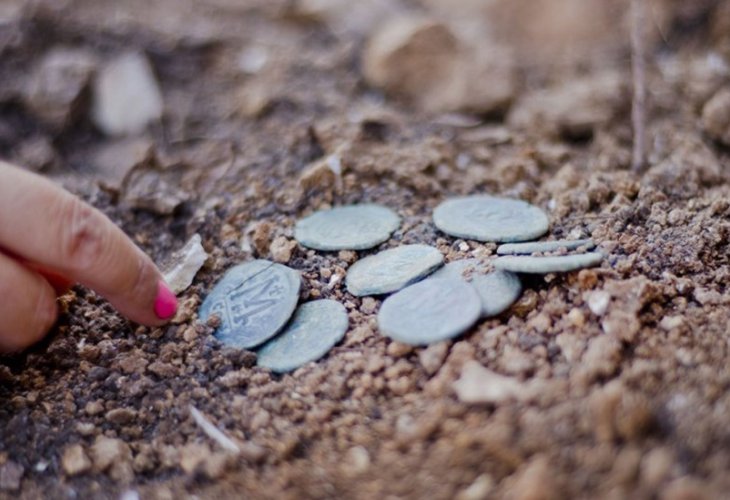Ancient Coins Unearthed During Highway Expansion
Nine bronze coins from 1,400 years ago were discovered during the expansion of Highway 1. These coins, found in a cloth purse near a collapsed structure, offer a glimpse into a forgotten past.
 The nine coins uncovered in the excavation (Photo: Yuli Schwartz, Israel Antiquities Authority)
The nine coins uncovered in the excavation (Photo: Yuli Schwartz, Israel Antiquities Authority)A treasure trove of nine bronze coins from the late Byzantine period (7th century CE) was uncovered during a rescue excavation led by the Israel Antiquities Authority. This was part of the construction work for the expansion of Highway 1, near Ein Hemed, funded by Netivei Israel.
The coins feature the likenesses of three Byzantine emperors: Justinian, Maurice, and Phocas. The fronts display the emperor in military attire holding crosses, while the backs often denote the coin's value, usually marked by the letter M.
Antoinette Landes-Nagar, the excavation director from the Israel Antiquities Authority, reported that "the coins were found next to a structure, within a collapse of large stones. It appears the owner wrapped them in a cloth purse and hid them in a niche within the wall during a time of threat, hoping to return, yet we now know he was unable to."
"The treasure testifies to the end of the site," Landes-Nagar added. "The historical background likely relates to the Sasanian Persian invasion in 614 CE, which was among the factors leading to the end of Byzantine rule in the Land of Israel."
Amidst invasion threats, the site’s inhabitants felt the looming danger and hid their money by the wall, hoping to return after the turmoil, but they never did. The site was eventually abandoned and destroyed, later buried, and became part of the area's signature terraces.
The structure and its accompanying winepress are part of a larger site that extends across Highway 1. Research suggests it was a settlement named 'Ein Biqomakuba,' which the nearby Arab village 'Beit Nekuba' preserves today. This site lies along a main road from the coastal plain to Jerusalem, serving Christian pilgrims traveling to the holy city, with settlements and waystations developing along its path.
According to Dr. Amit Shadman, Judea District Archaeologist, "The Israel Antiquities Authority and Netivei Israel will work together to preserve the site as a landmark in the landscape alongside Highway 1."

